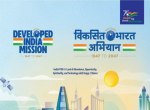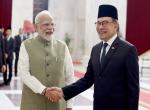India is gradually turning into a country where not only there is no respect for law, there is not even a fear of law. Laws are what bind a democratic society together because they create a social contract within a framework of laws which determine interpersonal relations and prescribe the bounds within which the fundamental rights, especially under Article 19 of the Constitution, may be exercised to maximise freedom while ensuring that the exercise of rights by one individual does not impinge upon the rights of another. Thomas Hobbes viewed the social contract not so much as a society of laws but rather as a discipline which ensured that the state of nature did not degenerate into the law of the jungle. To him John Locke’s state of nature was abhorrent because in it “ …dissolute condition of master less men, without subjection to laws and a coercive Power to tie their hands from raping and revenge… would create conditions in which there would be … no place for industry, … no culture of the earth; no navigation… no Arts; no Letters; and which is worst of all, continual fear and danger of violent death; And the life of man solitary, poor, nasty, brutish and short”. Such a social contract has a place only in a dictatorship, but the fact remains that unless there is a society of laws in which democratically framed laws provide the framework within which society will function, public order and tranquility cannot be maintained. For civilised society to exist, for democracy to flourish, we need a system of laws and for all citizens to work within the framework of law, respect the law and obey it.
Is India a society of laws? It claims that it is a democracy because every five years the people at large, through the ballot, have the right to vote a government out of power and to determine who will form the next government. But democracy demands that society will function according to laws and that there will be no arbitrariness, no violence and certainly no tyranny of an individual, a group or a set of interests which may try and impose their own views on the rest of society. In such a society, no one is allowed to decide which laws he or she will obey and which laws will be ignored, nor can anyone decide to take the law in his own hands because he is dissatisfied with certain events or with certain things of which he disapproves. The Indian Constitution guarantees the fundamental right of freedom of speech and expression, peaceable assembly and the formation of association or unions. However, these rights are subject to reasonable restrictions, to be determined by law, so that by exercising their rights no citizen or group jeopardises the security of the State, leads to incitement of an offence, disturbs public order, decency or morality or brings courts into contempt. It is for this reason that the Code of Criminal Procedure creates an Executive Magistracy, a judicial system and empowers the Magistracy and the Police to prevent offences, take preventive action in this behalf, issue prohibitory orders, order unlawful assemblies to disperse and to use necessary force to enforce the order and to take all such measures as many be necessary to ensure that public order, peace and tranquility are not disturbed. If an offence does occur, then the law empowers the police to register an offence, investigate it and produce the person against whom a prima facie case is made out before a judicial court. The courts are empowered to take cognisance of offences, charge-sheet and try offenders and, on conviction, award a suitable sentence as prescribed by law.
Such a system totally and absolutely precludes lynch law in which extra judicial punishment is inflicted by persons or mobs who not only are not empowered to punish but who themselves commit an offence by inflicting extra judicial punishment. However heinous the offence, the right to investigate, prosecute and punish vests in officers and courts mandated by law to perform this duty. Street agitations and trial by media are no substitutes for legal process. The worst form of extra judicial punishment is a riot in which a mob not only takes the law into its hands but indulges in acts of violence, including causing death, arson, molestation of women, loot and worse. A riotous mob represents the ultimate breakdown of law and order and the absence of government.
Recently in Muzaffarnagar District of Western U.P, an altercation took place between a Muslim boy and two Jat boys on an allegation that the Muslim boy had tried to molest a Jat girl. This matter could have been sorted out by the village elders or the police. Instead the situation took a violent turn, the three boys were killed and Jats and Muslims, who normally lived in close harmony, were at each other’s throats. Almost fifty people were killed and about fifty thousand people rendered homeless. It is only when the Army was called in that the situation limped back, not to normal but at least to a stage where the public peace was being maintained. The district administration of Muzaffarnagar, which should have intervened in the very first hour, seemed to be paralysed and there is some evidence that ruling party leaders directly intervened in order to make the police inconsequential and some opposition party leaders actually instigated violence. The cause of violence may be a small quarrel but the reason why riots continue over a long period of time is that the district administration and the police hesitate to act and, therefore, are paralysed and this encourages law breakers to take matters into their own hands. In the eighties of the last century, we have seen this happen in Meerut and in every case where rioting has been prolonged it is the failure of the district administration to intervene forcefully which had led to continuing violence.
Of course there is a political dimension to the problem. This is that political parties of all hues have started interfering in day-to-day administration with an effort being made to make the Magistracy and the Police so subservient that instead of enforcing the law, officers pander to the whims of the politician. In Articles 77 and 166, the Rules of Business clearly prescribes the functions of the political executive and the permanent executive. The Police Act gives the powers, responsibility and accountability of the police and the Code of Criminal Procedure gives the powers and duties of the Executive Magistracy and the Police. The scheme of rule of law in India is that whosoever the legislature empowers under law to perform a particular function or duty is required to perform such duty strictly in accordance with the legal mandate given to him and not at the behest of anyone else. Not even the Chief Minister of a State can direct or compel a Magistrate or a police officer to function in a partisan manner or seek the orders of politicians and others on how to deal with a law and order situation. In fact, apart from the Executive Magistracy and the Police, the law mentions no one else as having any powers whatsoever to deal with such a situation.
A police officer of the lowest rank is duty bound to prevent the commission of an offence (rioting is an offence), apprehend law breakers and take necessary steps to ensure that public order is maintained. He requires no one’s direction in this behalf and in fact if he hesitates he himself becomes a partner in law breaking. It is the job of the political executive to create an environment in which the magistracy and the police are enabled to function according to law so that the mandate of the legislature is fulfilled by them. Law and order breaks down only when the district administration fails to take timely action.
Incidentally, the worst communal riots in the history of that State occurred in 1969 when Hitendra Desai was Chief Minister. The Commissioner of Police of Ahmedabad had an understanding that the police should not use force and, therefore, the Ahmedabad Police was not only unprepared, it was actually disarmed. This understanding arose out of the officers’ thinking about what the Chief Minister, a Gandhian, wanted. The Chief Minister never tried to disillusion him in this behalf or to remind the Police Commissioner that it was his job to maintain public order. The district administration twiddled its thumbs whilst Ahmedabad burnt and it is only when my batch mate, H.K. Khan and a group of young IAS and IPS officers were brought in to control the situation that matters improved.
In Uttar Pradesh, the Samajwadi Party is not pro Hindu—in fact it leans over backwards to woo the Muslims whom it consider its own vote bank. Despite this, communal riots took place in Western U.P. and the government failed to anticipate the situation and subsequently to control it. In UP, the district administration has been interfered with and distorted by the politicians to an extent where the Magistracy and the Police no longer function independently. This is a certified recipe for disaster.
What has emerged in India is that law enforcement at all levels has declined. When I was a young District Magistrate it was expected that every police officer not only knew his duty but would intervene at the earliest juncture if he saw a situation developing which could lead to a breach of the peace. This, in turn, engendered both fear of the law and respect for it. Once a law breaker knows that he will be caught and punished he would be deterred from breaking the law. But, however, if people collectively feel that they can take the law into their own hands, there will neither be fear or law nor respect for law. People who claim to have a grievance no longer hesitate to blockade public streets and to disrupt traffic for hours on end. Railway lines are blocked because local people demand the stoppage of a train at their little station, thus throwing life out of gear throughout the railway system. Communities agitating for recognition as a backward class block off whole sections of the railway track and prevent the movement of goods and people over large sections of railways. What right do they have to stop the free movement of people in an India where Article 19 of the Constitution guarantees freedom of movement? People barge into hospitals and beat up doctors, hooligans wreck restaurants on St. Valentine’s Day, people jump traffic lights, encroach on public streets, defy lawful orders and resort to violence on trivial issues. There is no element of Gandhian Satyagraha in this. Such acts are the tyranny of a small minority which feels that violence is justified to put forward its point of view. Our administration tolerates all this and more and this has created an environment in India where there is no respect for law.
Pre modern India had its own code in which elders were respected, the Mohalla collectively decided what was permissible and what was not. Aberrant behaviour towards women resulted in a social outcry and a boycott of the errant person and society as a whole felt responsible for the safety and dignity of women. All this is a matter of the past and Khap Panchayats are only a reflection of traditional society trying to rediscover and enforce the old constraints. When traditional remedies no longer work, the law must step in. And for it to be able to do so, every transgression of law should be treated as an offence which must be punished. When people begin to fear that violation of law will lead to unpleasant consequences for themselves they will automatically begin to fear law because they know that there will be zero tolerance law enforcement. A stage then comes when obedience of law becomes an automatic reflex and from this is born a respect for law as something which must be obeyed because it is in the interest of the society to do so. When that happens, the authorities charged with law enforcement will begin to enforce the law without fear or favour and India will be a much more peaceful country.
There are certain minimum requirements which precede strict enforcement of law. The most important of these is that law enforcement agencies, mainly the police, should be provided a blueprint of what is expected of them and for this purpose government, in whom superintendence vests, must lay down the rules, the regulations in the police manual, the scheme of policing and the broad guidelines within which the police is required to function. The police, under its own hierarchical command structure, must then be told that it will function within the law and the framework of rules, regulations and guidelines and in doing so neither would anyone be allowed to interfere with its working, nor would officers be required take orders from anyone except from their own superiors while performing their lawful functions. The law, especially the Code of Criminal Procedure in the matter of investigation of offences, already provides for such autonomy of functioning, but this needs to be backed up by rules, regulations and a policy framework within which the police is immunised from undue interference and the officers are ensured stability of posting. In this behalf, I commend the words of the Soli Sorabjee Committee on Police Reforms in the model Police Bill drafted by it. The committee states in the section relating to superintendence of the police, “ (1) It shall be the responsibility of the State Government to ensure efficient, effective, responsive and accountable Police Service for the entire State. For this purpose the power of superintendence of the Police Service shall vest in and be exercised by the State Government in accordance with the provisions of this Act. (2) The State Government shall exercise its superintendence over the police in such manner and to such an extent as to promote the professional efficiency of the police and ensure that its performance is at all times in accordance with the law. This shall be achieved through laying down policies and guidelines, setting standards for quality policing, facilitating their implementation and ensuring that the police performs its task in a professional manner with functional autonomy”. This is the real ideal of the relationship between government and the police in which government guides and the police performs. To this may be added what the committee has recommended about coordination within the district administration in which the District Magistrate will coordinate the functioning of the police with other agencies, especially in matters of public peace, tranquility, removal of persistent public grievances and interdepartmental coordination. If the Magistracy and the Police function according to law, if there is zero tolerance policing so far as crime is concerned, we can build both fear of law and respect for law.
Published Date: 16th October 2013, Image Source: http://muslimmirror.com









Post new comment